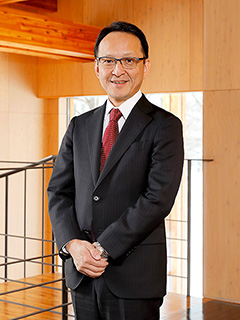
-
School of Medicine
-
Educational Content
-
Prospective Students
-
Current Students and Alumni
International Affairs

-
Graduate School of Medicine
-
Educational Content
-
Prospective Students
-
International Affairs

-
Graduate School of Biomedical Science and Engineering
-
Educational Content
-
Prospective Students
-
Other

-
Faculty of Medicine
-
Organizational Structure
-
Industry-academia Cooperative Projects

-
Overview
-
Entrance Examinations
-
Publications and Promotional Material
-
Various Types of Data
Greetings from the Dean
- HOME
- School of Medicine
- Greetings from the Dean
 Hokkaido University School of Medicine is one of Japan’s most prestigious medical schools, boasting a long history and proud tradition. It was originally established in 1919 as the School of Medicine of Hokkaido Imperial University. The origins of Hokkaido University date back to the establishment of Sapporo Agricultural College in 1876. In 1918, it was reorganized as Hokkaido Imperial University, and the School of Medicine was founded the following year. Since then, the school has produced over 10,000 graduates who have proceeded to play active roles in the fields of clinical medicine and medical research.
Hokkaido University School of Medicine is one of Japan’s most prestigious medical schools, boasting a long history and proud tradition. It was originally established in 1919 as the School of Medicine of Hokkaido Imperial University. The origins of Hokkaido University date back to the establishment of Sapporo Agricultural College in 1876. In 1918, it was reorganized as Hokkaido Imperial University, and the School of Medicine was founded the following year. Since then, the school has produced over 10,000 graduates who have proceeded to play active roles in the fields of clinical medicine and medical research.
At Hokkaido University School of Medicine, the educational goal is to “equip the next generation of doctors and medical researchers with extensive medical knowledge, a strong sense of ethics, a well-rounded character, and the global outlook needed to contribute to advances in medical science and the practice and development of clinical medicine.” To achieve this goal, students are expected to acquire a broad range of fundamental and specialized medical knowledge, along with deep critical thinking, analytical skills, adaptability, creativity, and the ability to engage in international settings. The program aims to produce not only physicians who contribute to medical care in Japan but also those with a global perspective and a spirit of dedication, capable of making significant contributions both domestically and internationally. Graduates are also expected to become key players who drive innovation in medical research.
Medical students are expected to cultivate a rich sense of humanity by acquiring a broad education, including liberal arts subjects. They must understand societies and cultures comprising different people, act both independently and cooperatively, and demonstrate leadership. Proficiency in foreign languages, such as English, is also essential as a means of communication on a global scale.
The educational environment at Hokkaido University allows students to acquire not only a medical education but also a broad liberal arts education. In the first year, in particular, students are encouraged to study a wide range of subjects in the natural sciences and humanities. Medical education at this school has a strong emphasis on clinical clerkships. Through hands-on experience in real medical settings, students learn to understand the duties and responsibilities of being part of a medical team. They acquire the specialized knowledge, diagnostic skills, and medical techniques necessary to become competent physicians. In recent years, Hokkaido University has welcomed a growing number of international students from Asian and European countries, providing an educational environment where students can learn alongside peers from diverse backgrounds. Students at the School of Medicine also have opportunities to be dispatched overseas, with around ten students annually participating in clinical training at medical institutions abroad. Medical students at Hokkaido University are expected to develop a global perspective from an early stage, as well as the ability to cooperate with and embrace diverse cultures and societies as internationally minded professionals. Extracurricular activities are also thriving at the University. Participation in various clubs, whether university-wide or within the School of Medicine, including immersion in art, will strengthen body and mind and serve as a valuable foundation for an outstanding, well-rounded future physician or medical researcher. In recent years, AI has been rapidly integrated into many fields of medicine. It is also essential for students to acquire accurate knowledge and literacy regarding AI and its applications in medicine during their studies.
Hokkaido University is located in the heart of Sapporo, a city with a population of two million, and boasts a vast, nature-rich campus. We sincerely hope that this exceptional environment will support you to concentrate on your studies, form lifelong bonds with friends, seniors, juniors and mentors, and grow into physicians and medical researchers with creativity and a strong sense of ethics, contributing to the advancement of medicine and healthcare. Hokkaido University School of Medicine welcomes students who seek personal growth through the study of medicine and can persevere to achieve self-set lofty ambitions and ideals.
April 1, 2025
TANAKA Shinya, M.D., Ph.D.
Dean, Hokkaido University School of Medicine

